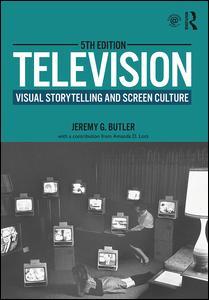Television (5th Ed.) Visual Storytelling and Screen Culture
Auteur : Butler Jeremy G.

For over two decades, Television has served as the foremost guide to television studies, offering readers an in-depth understanding of how television programs and commercials are made and how they function as producers of meaning. Author Jeremy G. Butler shows the ways in which camera style, lighting, set design, editing, and sound combine to produce meanings that viewers take away from their television experience.
Highlights of the fifth edition include:
- An entirely new chapter by Amanda D. Lotz on television in the contemporary digital media environment.
- Discussions integrated throughout on the latest developments in screen culture during the on-demand era?including the impact of binge-watching and the proliferation of screens (smartphones, tablets, computer monitors, etc.).
- Updates on the effects of new digital technologies on TV style.
PART I TELEVISION STRUCTURES AND SYSTEMS
1. Television Structures and Systems: Ebb and Flow in the Network Era
2. Television Structures and Systems: Ebb and Flow in the Postnetwork Era - Amanda Lotz
3. Narrative Structure: Television Stories
4. Building Narrative: Character, Actor, Star
5. Beyond and Beside Narrative Structure
6. The Television Commercial
PART II TELEVISION STYLE: IMAGE AND SOUND
7. An Introduction to Television Style: Modes of Production
8. Style and Setting: Mise-en-Scene
9. Style and the Camera: Videography and Cinematography
10. Style and Editing
11. Style and Sound
PART III TELEVISION STUDIES
12. An Introduction to Television Studies
13. Textual Analysis
14. Discourse and Identity
Jeremy G. Butler is Professor of Journalism and Creative Media at the University of Alabama. He has taught television, film, and new media courses since 1980 and is active in online educational resources for television and film studies.
Date de parution : 04-2018
17.8x25.4 cm
Disponible chez l'éditeur (délai d'approvisionnement : 14 jours).
Prix indicatif 93,24 €
Ajouter au panierDate de parution : 02-2018
17.8x25.4 cm
Thème de Television :
Mots-clés :
Multiple Camera Sitcom; Multiple Camera Mode; media aesthetics; Tv Program; television and american culture; Multiple Camera Production; netflix; Single Camera Production; amanda lotz; Non-narrative Programs; american film and tv history; Narrative Programs; jeremy butler; Network Era Television; production studies; Long Shot; mass communication; Single Camera Mode; film and television; Commercial Breaks; television studies; Dominant Cultural Order; social media; Tv Text; streaming services; Non-narrative Television; Amanda D; Lotz; Continuity Editing System; Tv Household; Grey’s Anatomy; Non-narrative Structures; Non-narrative Genres; Vice Versa; Deep Space; Reality Tv; Sage Handbook; Feminist Television Criticism



